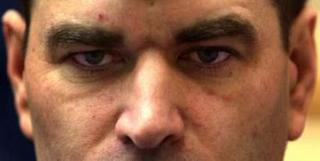So you don't think the slow pace of posting has been an indication of inactivity. On Saturday I spent the afternoon with the Serbian Radical Party. They had a new film to present, called «Istina» («Truth»), meant to be their response to the onslaught of new information about crimes against humanity, war crimes and genocide in Bosnia. The event was held in the large cinema at Sava Centar, heavily advertised and an overflow crowd was assured by the lot full of buses from various provincial places bringing SRS supporters from places where their party is the only one with a local organisation to the city.
The ceremony began with speeches from the SRS leadership—a greeting sent by Vojislav Šešelj from the Hague, dramatically read by Aleksandar Vučić, the presentation of the usual scenographic bit players at right-wing events (the frail Patriarh Pavle, the diabolical Smilja Avramov, the former poets whose names nobody remembers). Then acting Radical-in-chief Tomislav Nikolić gave an outwardly conciliatory address recognising crimes and the need to punish them, but denying any uniqueness for the Serbian side. I thought that this was an interesting step forward for SRS, staking out a new position between denial and recognition which would place them in the spineless center of Serbian politics, but my friends persuaded me that this is the public face which SRS trots out every six months or so to hide the private face. Perhaps so, as they have put a good deal of effort into developing an outward surface which might resemble that of a legitimate political party.
The film itself offers little of interest. For the most part it is a new montage of propaganda clips that anybody who watched Serbian state television during the time when SRS and their allies controlled it already saw repeatedly between 1991 and 1995, and again for a period between 1998 and 2000. What new material there is has no source attribution. The film itself is not signed by an author. My own feeling was that the handpicked SRS audience was not particularly impressed either, as there was a lot of sidetalk, milling about, and complaint about the quality of production. If this is the right wing reply to the existing evidence, it may be an admission that they do not have replies.
On Sunday evening we went to the commemoration of Srebrenica victims which was organised in Belgrade by the feminist human rights group Žene u crnom, on the city's principal square. A circle of activists and supporters, mostly dressed in black, held white roses in a circle around a makeshift memorial of votive candles. Some held banners declaring «never again» in different languages, some held banners identifying them as visiting activists from other countries. There was a large and mostly disengaged police presence, in partial riot gear and doing nothing.
Around the perimeter milled a small group of spectators and a smaller group of local fascists. There were not many fascists, perhaps twenty or thirty, and several of them were faces that I recognised as regular provocateurs from previous public events. Most of them hung back away from the perimeter of the group while a few of them circulated around the perimeter shouting insults. At one point a group of them moved into the center of the circle, but were escorted out by a single police officer. At another point a group of them launched into some football-fan style chants—one of them threatening violence against human rights activist Nataša Kandić (who was there, of course), and another the increasingly familiar ominous rhyme «Nož, žica, Srebrenica» (literally it is not much—«knife, wire, Srebrenica»—but its intent is to threaten a reprise).
Then some of the fascists tossed a tear gas grenade into the center of the circle. The participants in the commemoration dispersed, the semisentient police did nothing that anybody could observe, and there was a brief moment of disruption. My wife and I ducked into the restroom of a coffee shop to wash our hands and rinse our eyes, and then everyone returned to their positions, the participants to the circle, the fascists to shout and toss things from the wings, and the police to discreetly and inactively stand at a few points between the two groups. The ceremony continued in deliberate silence, with some people coming to the center of the circle to light candles, then the participants to place their roses at the makeshift memorial (a paper sign at the top of the steps below the equestrian statue at the square). The police escorted the core activists and international visitors away, we hung back to chat with friends, and a friend bet that the memorial would remain in place five minutes. She was off by four and a half, a group of five young fascists immediately ran up the steps, ripped the memorial sign, and ran away.
My fascist weekend was less tragic than sad, a recurring meeting of incomprehension, incapacity and powerlessness. My wife and I went off to have drinks with our friends, raise a toast to our first (really!) taste of tear gas, and share our wonder. The old guard is finally in retreat, five years after kobajagi losing power. But there is no new guard, and if there were it would have a hard time finding anything to say, and if it had anything to say not many people would be willing to listen.
 1. Niš, March 2004.
1. Niš, March 2004. 2. The mosque after the attack.
2. The mosque after the attack. 3. Support for the arsonists from the Hair Club for Men.
3. Support for the arsonists from the Hair Club for Men.
 1. Niš, March 2004.
1. Niš, March 2004. 2. The mosque after the attack.
2. The mosque after the attack. 3. Support for the arsonists from the Hair Club for Men.
3. Support for the arsonists from the Hair Club for Men.









